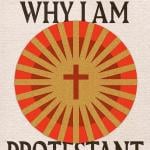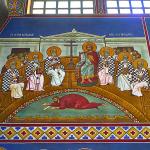My hat’s off to Roger Revell for his third installment in the St. Peter’s Fireside ‘classical Christianity’ responses to Douglas Todd’s liberal Christianity primer. Whereas the series started out more combative than was necessary, Revell has managed to strike an ecumenically conciliatory tone, finding common ground between Todd’s liberal Christianity and his own classical Christianity in the practice of social justice. Although this ecumenism is precisely what I’ve advocated in my previous responses (see here for the first and the second), I won’t try to take credit here. As Johann Sebastian Bach used to write at the end of his compositions, SDG, i.e. Soli Deo Gloria.
My post will attempt to draw out the implications of Revell’s post for Christian practice in Vancouver. Once again, Revell is responding to Todd, who wrote:
Jesus was not status quo. He turned the established order upside down, de-emphasizing hierarchy. Instead of promoting “family values,” he asked followers to leave behind their parents. Progressive Christians note how he befriended outcasts, the poor, women, children and tax collectors. He advocated simple, equal, communal living. He also pressed for social and economic justice, for which he paid the ultimate price, execution. Many liberal Christians believe Jesus embodied the divine power of creative transformation.
As Revell suggests, practice is what matters. Noting that the practices of saints as diverse as St. John Chrysostom and John Calvin focused on the poor, as did a spectrum of Roman Catholic, evangelical, ‘creedal,’ Anabaptist, and liberal Protestant practitioners, Revell finds that liberal Protestantism does not have ‘the market cornered’ for putting Jesus’ ‘transformative values’ to work. He’s right, of course. As Benedict XVI put it in Spe Salvi, faith is performative, that is, what you do demonstrates what you actually believe.
Another way of putting this, of course, is that talk is cheap. Revell lists example after example of good works done by the historic Christian church as well as a diversity of ecclesial communities. But he also makes a jab at modern Protestant fundamentalism that I think is well worth revisiting:
If one pays attention only to certain “fundamentalist” Christian groups from the 20th century, this point can be missed. Fundamentalism, especially the American variety, sometimes boasts a poor track record on issues of social justice. In some such groups—as I know from personal experience—the term “social justice” is highly suspect. However, when this peculiar movement is situated in the broader context of church history, its muted concern for Jesus’ social vision can be seen for all its oddness.
In other words, while classical Christians have a long track record of social justice activism, fundamentalists are odd because they do not. One question to ask is why not? But because the answer has already been adequately provided in places like George Marsden’s Fundamentalism and American Culture, there’s little need for me to delve into an in-depth history here, except to say that it was the fundamentalist movement’s battle with modernist mainline Protestants that made them withdraw so much into their private congregations in the 1920s that it became embarrassing – so embarrassing that Carl Henry, an evangelical theologian who was no friend of liberals, had to write a book titled The Uneasy Conscience of Modern Fundamentalism, castigating fundamentalists for not caring about important issues in the 1940s, like, say, worldwide military conflict, the ecological crisis, and the nuclear arms race. For all of that, you can do your homework and read that abundant literature, starting with Marsden and going to, say, Mark Noll’s Scandal of the Evangelical Mind and Molly Worthen’s Apostles of Reason. Revell seems to be aware of all this work too, and so should all of our readers.
The more interesting question to ask, though, given that talk is cheap, is: what implications does Revell’s understanding of classical Christian practices of social justice have for churches in Vancouver? My answer to this question will suggest that St. Peter’s Fireside is pretty much standing on the shoulders of giants.
In 2007-8, for example, one of Douglas Todd’s big stories concerned Tenth Avenue Alliance Church, now known as Tenth Church Vancouver (and not to be confused with this story). At that time, Tenth’s attempt to renovate their building came under contestation from the municipal government because of their feed-the-hungry program and shelter. Although their social service plans had originally been helped by another department in the government, they were required by the city to get a social services permit. This produced an outcry among various religious communities from various traditions across Vancouver, and it led to the formation of an interfaith coalition called Faith Communities Committed to Solidarity with the Poor (FCCSP). FCCSP held neighbourhood meetings and press conferences for a year demanding that the city back down from their requirement for theological reasons — indeed, the same reasons that Revell discusses in his post. In a document titled ‘The Social Vocation of the Church’ posted on the website of Streams of Justice (another organization we’re about to talk about), FCCSP laid out what Revell would call a ‘classical Christian’ argument that within orthodox streams of Christianity, as well as most other religious traditions, serving the poor was a central element of faith practice that could not be separated from worship. If the city was requiring Tenth to get a permit, it meant that the city was doing theology and colonizing Tenth’s religious practice. After a year of FCCSP’s work, the city backed down – pretty much because of FCCSP’s classically Christian argument. In turn, since FCCSP, Tenth has itself also been articulating to its congregation the importance of the classically Christian spiritual disciplines, including the practice of social justice, so much so that its senior pastor, Ken Shigematsu, has written a whole bestselling book on the topic, God in My Everything.
And yet, to bring up Streams of Justice suggests that what ‘social justice’ means is beyond even Revell’s conception. For Revell, contemporary examples like World Vision, the Mennonite Central Committee, and evangelical relief agencies are adequate illustrations for the practice of justice. But for Streams of Justice, that only scratches the surface. Founded in large part by Hebrew Scripture scholar Dave Diewert, Streams of Justice takes a biblically (read: classically) prophetic stance against colonization in Vancouver. In technical political language, this means that Streams of Justice doesn’t just participate in social services, but in the politics of decolonization. With the buzz in Vancouver’s Christian circles around the Truth and Reconciliation Commission, one might think that this means that churches have to own up to their historical record of participating in the injustices of Canada’s residential schools to ‘kill the Indian within.’
Yes and no.
The politics of decolonization would say, yes, of course, churches have to own up to their historical wrongs. But no, that’s not all there is to it because there are also contemporary colonial policies to be contested, not least of which is the recently federally approved Northern Gateway oil pipeline through British Columbia that is being contested by several First Nations. Chinese Christians in Action’s Bill Chu has also recently been working with First Nations against a resort being built on their traditional lands. Streams of Justice chalks up Vancouver’s Downtown Eastside policies to be colonizing as well, often leading to community fragmentation in the name of scattering a skid row population when in fact it takes away informal networks of support for people who depend on it. For these classical Christians, social justice is not just a matter of service – it’s a matter of looking at the whole structure of cities, economies, and political formations and contesting the powers of colonization.
In Vancouver, this also hits close to home with the property market. True to form, St. Peter’s Fireside’s clergy have been inadvertently rolled into these politics. On June 10, Alastair Sterne’s wife, Julia Nicole Sterne, blogged about how to deal with disappointment, using her own frustration with Vancouver’s high-priced, hyper-competitive property market as an example:
Alastair and I have been in the market for a new home for almost a year. Almost. A. Whole. Entire. Year. We have never been in want, but we are now in a season of wanting; wanting a permanent home, wanting a place for Ansley and any other babies to grow up, wanting some stability and financial responsibility and to make something our own. In this past year we have made multiple offers with nothing secured.
This provoked a cranky response from Garth Turner, an investment advisor who was a Member of Parliament for nine years who took care of a lot of economic policy. Aside from highly misogynistic remarks about Julia — which, by the way, all classical Christians should contest — the post chalks up Julia’s disappointment to just another day at the market, where rational investors look at the ‘free money’ to be had in Vancouver’s property market and rationally capitalize on it. For geographer Nick Blomley, though, this kind of thing isn’t just market rationality — it’s colonialism that displaces those who can’t afford the increasingly unaffordable housing in Vancouver and that — mirroring Streams of Justice’s decolonization politics — fragments the social networks of the Downtown Eastside. For St. Peter’s Fireside, this is becoming a personal experience of colonization. The question is, what solidarities will these ‘classical Christians’ discover in their practice of social justice? What will it have to do with their engagement in issues of affordable housing as a human right? racial politics? indigenous sovereignties? ecological justice? Exciting times.
In other words, Revell has given Vancouver’s public sphere an excellent rundown of how what he calls ‘classical Christianity’ — a longstanding orthodox tradition that ranges from the early church to Chrysostom to Calvin to Wilberforce to the present — converges with ‘liberal Christianity’ in its practice of social justice. What I’ve attempted to do in this post is to bring Revell’s insights home. Don’t be surprised, then, if you see St. Peter’s Fireside exploring the politics of decolonization in Vancouver. It would be very much part of classical Christianity to do so.
I’m looking forward to Revell’s next post on evolution, which I am sure will be just as insightful as his thoughts on social justice.











